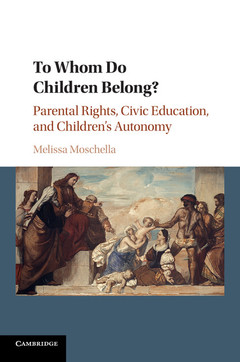Description
To Whom Do Children Belong?
Parental Rights, Civic Education, and Children's Autonomy
Author: Moschella Melissa
This book offers a foundational defense of the rights of parents as primary educators of their children.
Language: English
Subject for To Whom Do Children Belong?:
Approximative price 32.87 €
In Print (Delivery period: 14 days).
Add to cart
To Whom Do Children Belong?
Publication date: 05-2017
Support: Print on demand
Publication date: 05-2017
Support: Print on demand
Approximative price 106.56 €
In Print (Delivery period: 14 days).
Add to cart
To Whom Do Children Belong?
Publication date: 06-2016
Support: Print on demand
Publication date: 06-2016
Support: Print on demand
Description
/li>Contents
/li>Biography
/li>
Most people believe that parents have rights to direct their children's education and upbringing. But why? What grounds those rights? How broad is their scope? Can we defend parental rights against those who believe we need more extensive state educational control to protect children's autonomy or prepare them for citizenship in a diverse society? Amid heated debates over issues like sexual education, diversity education and vouchers, Moschella cuts to the heart of the matter, explaining why education is primarily the responsibility of parents, not the state. Rigorously argued yet broadly accessible, the book offers a principled case for expanding school choice and granting exemptions when educational programs or regulations threaten parents' ability to raise their children in line with their values. Philosophical argument is complemented with psychological and social scientific research showing that robust parental rights' protections are crucial for the well-being of parents, children and society as a whole.
Introduction; 1. Parent-child bonds, special obligations and parental authority; 2. Parental rights as conscience rights; 3. Parental rights and education for liberal democratic citizenship; 4. Parental rights and children's autonomy; 5. Policy implications.
Melissa Moschella is an Assistant Professor of Philosophy at the Catholic University of America, Washington DC. She speaks and writes for both scholarly and popular audiences on topics including marriage, parental rights, reproductive technologies, and religious freedom.
© 2024 LAVOISIER S.A.S.



